Wrestling storylines aren’t like any other storylines you’ll see on TV; they’re typically much, much worse. No ordinary TV series could get away with the disjointed plots that wrestling fans are subjected to on a regular basis. Even series with the most notoriously convoluted stories made up as the writers went along, like The X-Files or Twin Peaks or Lost, can’t hold a candle to the inconsistencies, plot holes, and revisionism found on a month’s worth of Raw.

So when some particularly egregious development happens on wrestling, there is a large portion of the fan base that freaks out, while there’s another, seemingly more mature segment of the audience that tells those other guys to calm down and keep watching, as it will ultimately work out for the best. That latter portion of fans, of course, forgets that they’re talking about pro wrestling, where the notoriously flaky writers have shorter attention spans than the audience.
The point is: in any normal work of fiction, a disturbing turn of events in the story, like, say, the protagonist encountering terrible adversity and blatant racism, does not ruin the work but makes it better, because it all gets resolved at the end and makes the culmination of the hero’s journey all the more satisfying. In wrestling, a disturbing turn of events in the story ruins the angle half the time because nothing gets resolved.
Which takes me to this week’s induction: Triple H vs. Booker T. I don’t know whether the program was supposed to turn out how it did all along, or whether mid-way through the storyline somebody nixed the title change, but this Wrestlemania XIX feud and match turned out to be perhaps the biggest feel-bad story in all of wrestling and *the* prime example of how easily a story of Good triumphing over Evil can be transformed from inspiring to depressing simply by having Evil win.
The story of this match was that Booker T had overcome all odds to make it in wrestling, and by winning the World title and standing atop the (Monday night) wrestling world, he would prove that anything is possible. To that end, Booker T opened up about his difficult past, from his being orphaned at age 12, to serving prison time for armed robbery, to feuding over the letter T with Ahmed Johnson.
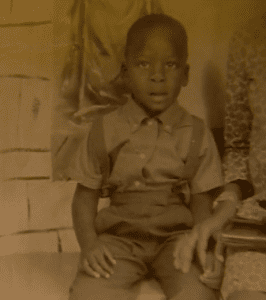
You might have heard about this rocky past in the WWE Network documentary, less-than-tastefully titled, “Sentenced to Greatness.”
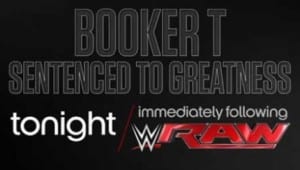
On the flip side was his opponent, Triple H, who had been handed everything in life. not only had he been born with a silver spoon in his mouth (a gimmick backstory the announcers brought up for the first time since about 1997), but he had literally been handed the World title by Eric Bischoff back in August. Since then, he had enlisted wrestling royalty in the form of Ric Flair to help him cheat to win, a strategy that saw him vanquish worthy opponent after worthy opponent after Scott Steiner and send them packing back down the card, while retaining the title for practically the entire period leading into Wrestlemania.
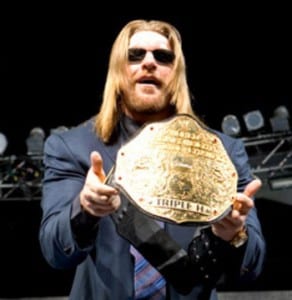
Things were looking up for Booker T at the outset of this angle. Not only did he win a 20-man battle royal to earn his title shot at Wrestlemania, but he did so by eliminating The Rock, one of WWE’s biggest stars ever and the man who had shown him up at every opportunity during the Invasion storyline.
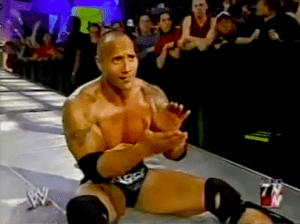
And then the promos started. First, Triple H interrupted Booker T’s victory speech and proceeded to look him up and down like a slave on the auction block.
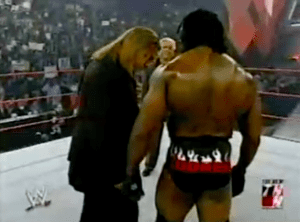
Hunter then told Booker T that “people like you” didn’t get to be world champion, while people like himself did. Uh, could he… no, no, he couldn’t have been talking about black people and white people. I mean, this was an international, publicly-traded company.
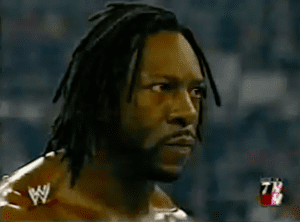
Next, he informed the uppity Booker T that he was only good for entertaining and making people like him laugh, before telling his challenger to dance for his amusement. Hmmm…. Triple H was really treading the line here, stopping just short of singling out Booker’s race.
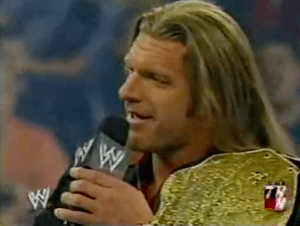
Still, he could maintain plausible deniability on the racism front as long as he limited himself to digs at Booker T’s dancing, and his nappy hair.
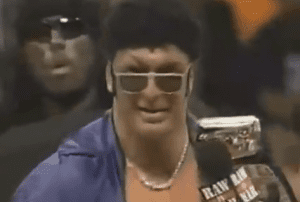
Later, WWE would go into damage control, with Triple H indignantly denying any racial connotation to his promo on Booker T (the same way he flipped off anyone who found his Katie Vick stunt offensive) while accusing the people who thought otherwise of being the real racists, and one announcer trying to claim that by “people like you,” he meant WCW guys.
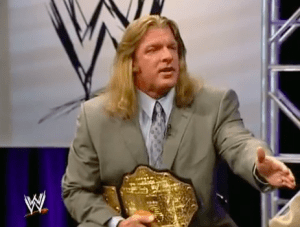
So I guess when he said Booker T was only there to dance and entertain, he was alluding to Disco Inferno and Alex Wright.
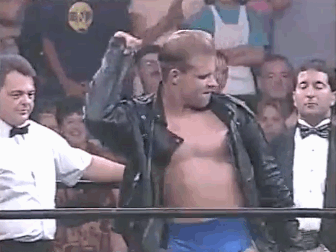
So what did Booker T do while Triple H demeaned him and his accomplishments? In the words of Edwin Starr, one of those people like Booker T (by which I mean, an entertainer), absolutely nothin’! Well, he did offer up a rebuttal where he actually admitted that “some of the stuff” Triple H said was true, but that he’d win the title anyway, to which Triple H smirked and talked down to him like a child — or, in keeping with the Jim Crow-era spirit of the promo, a pickaninny.
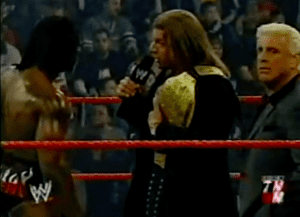
In fairness to Booker, he did show some backbone the next week, punching out Ric Flair after he suggest Book carry Triple H’s bags and drive his limo…
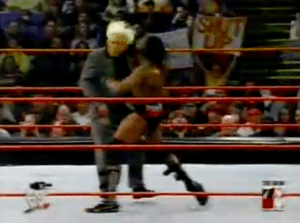
…then taking down Triple H after The Game threw a dollar at him and ordered him to fetch a towel. It served Naitch and Aitch right for trying to reduce Booker to a degrading stereotype. You know, that stereotype about WCW guys.
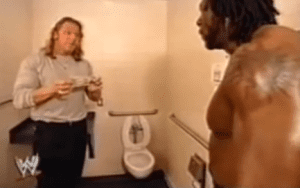
I know this feud had absolutely nothing to do with race, so do you think it was a coincidence that Triple H’s hand-picked opponent that night was Maven, who one announcer from Memphis suggested should “know his place”?
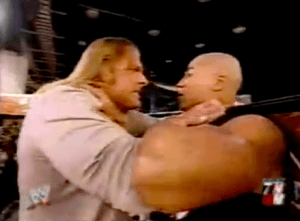
Racism aside, a win for Booker at Wrestlemania would make everything right, no matter how tasteless the build-up. Perhaps hoping to test that theory, one announcer from Memphis in a crown took it upon himself to act like a total jackass. Jerry Lawler thought the fact that Booker T had been in prison was gut-bustingly funny, when in fact the only thing funny about it was his mug shot.
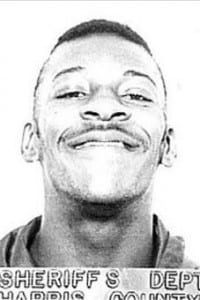
All match long, Lawler incessantly harped on the fact that Booker T had been to prison, while Jim Ross got seriously peeved at King driving that point into “the godda— to the ground,” then alluded to Lawler’s own past legal troubles. When Lawler joked that Booker T had been born on a pool table, Ross wondered whether he had learned that from a drunken Howard Finkel. (Nah, sounds more like something Michael Hayes would say)
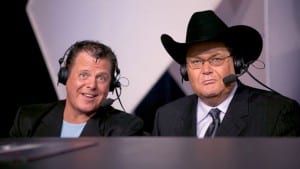
With the unrelenting bickering between announcers distracting from the match, you’d be forgiven for thinking you were watching a current Raw telecast.
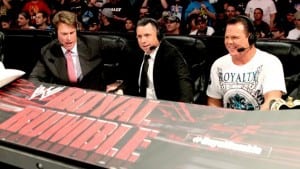
Booker T valiantly fought to overcome the odds — symbolic of the great odds he had had to surmount just to get into the wrestling business — shaking off Ric Flair repeatedly and finally delivering a Houston Hangover to Triple H.
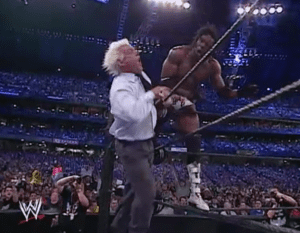
Of course, he took way too long to go for a cover, and when he managed that, he could only muster the strength to cover Triple H with one arm, so obviously this was not the finish of the match. No one ever, ever won after that much hesitation and a weak cover. Remember that in a minute.
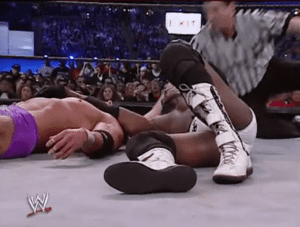
Booker T then regrouped and attempted his patented running scissor kick, but just a few steps short of his opponent, he simply collapsed and clutched his leg. Triple H followed up with a Pedigree and both men lay on the canvas.
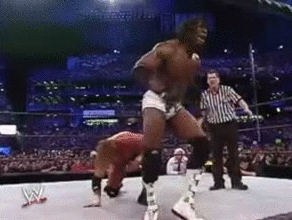
This was a standard double-down: the part of the match where both men are knocked to the mat and struggle to get back to their feet. This spot essentially resets the match, meaning it’s anyone’s ball game as the two opponents each desperately try to put the other man down for the count.
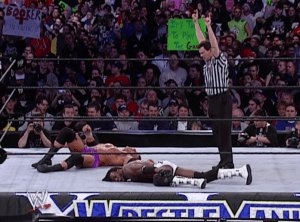
Understand that there should have been no way the match would end here. Everyone knew it. Not only did the fans think this Pedigree was simply a transition move, but so did the announcers, who called it a desperation move as they casually waited for either man to make his next move.
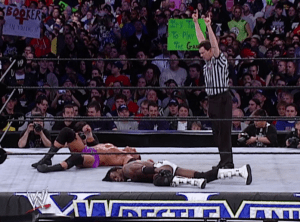
That next move was, as expected, a slow, weak cover by Triple H, who, after 23 seconds of rest time, draped his arm over his opponent just as Booker T had done a minute earlier. This time, the referee simply counted to three and the bell rang.
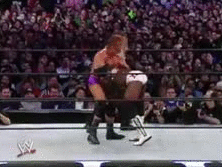
There was no kickout. There was no triumphant comeback. There was no “dreams do come true” moment of redemption for the lifelong underdog. Instead, the man whom everyone from the champion to the color commentary had said was a loser who would never amount to anything simply proved his critics correct.
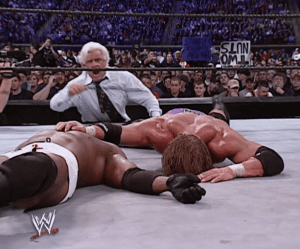
The message wasn’t so much that Triple H was great, just that Booker T just wasn’t that good, stumbling at the finish line, as it were, and getting beaten in a scenario that every single wrestler before him had survived.
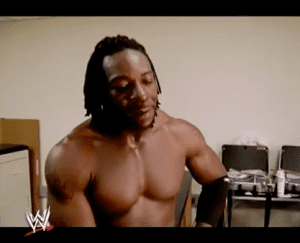
There’s a certain amount of time after a finishing move is hit after which it is acceptable, nay, mandatory that an opponent kick out. Sure, no one’s allowed to get up a second or two after the Pedigree (unless it’s 1996 and you’re The Ultimate Warrior… or Freddie Joe Floyd)…
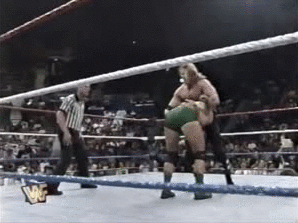
…but a rest period that long — longer than the entire *match* for that very title nine Wrestlemanias later — would have obviously given Triple H an excuse for his signature move not putting away his opponent. Instead, Booker T lost where no man had lost before.

The match itself was actually pretty good, but its abrupt and unsatisfying ending completely overshadowed everything that preceded it. After all, practically no one remembers “Our American Cousin,” and if they do, they know it only as the play Lincoln was watching when he got shot by John Wilkes Booth.
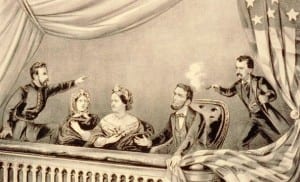
Hunter never did get his comeuppance from Booker or pay any price for his racist worldview.
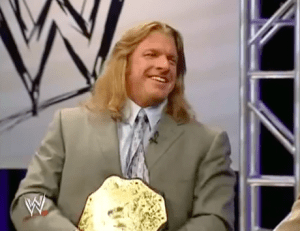
In fact, Triple H making Booker T look like a total chump seems to be a running gag in WWE, with The Game beating him at Summerslam 2007 and, more recently, mock-firing him just to demonstrate that he could.
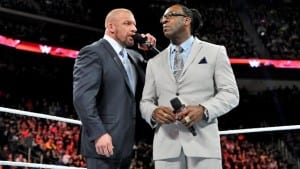
Booker T, African-American symbol of redemption and hope, would never become World Champion.
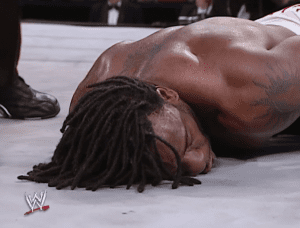
Instead, King Booker, comically delusional cartoon character, would win the title three years later from a fellow WCW veteran who had somehow been booked as an even bigger loser than Booker, Rey Mysterio.
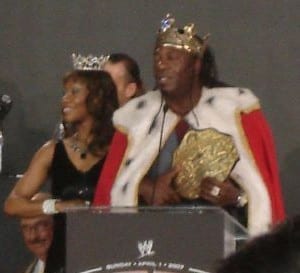
As for the racist, arrogant Triple H? He eventually lost his title to Goldberg, at last proving that a WCW guy could win the big one…
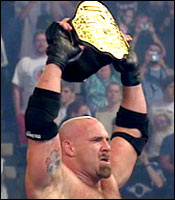
…provided he wasn’t, like, black or anything.


